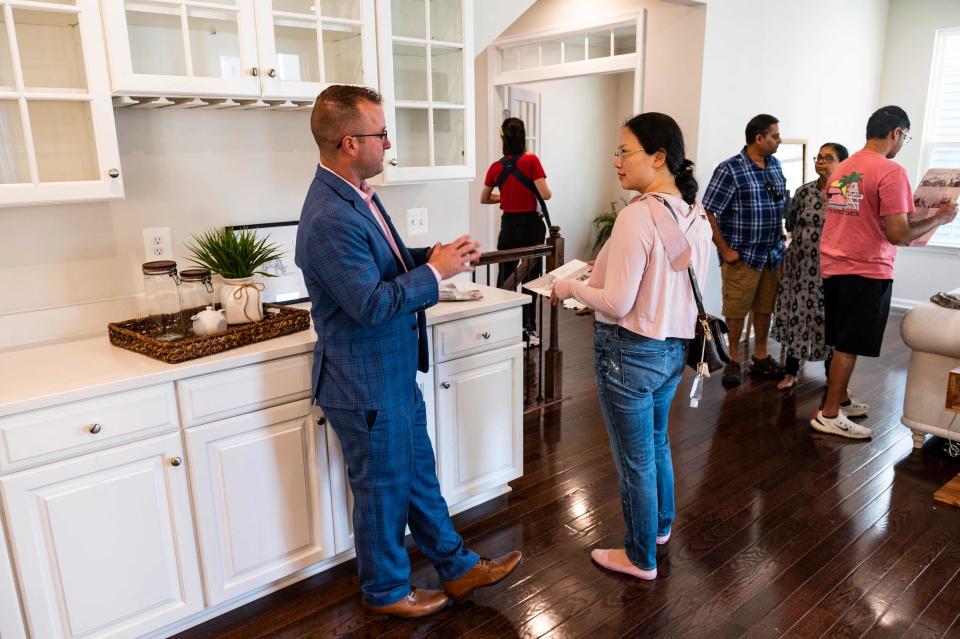First-time homebuyers aren't buying until mortgage rates drop. It could be a long wait.
In a recent poll, 71% of potential first-time homebuyers said they won’t enter the market until interest rates drop.
Prospective homeowners sit at an impasse. Mortgage rates are not particularly high, at least in a historical sense: Roughly 7.5%, on a 30-year fixed-rate loan. Yet, first-time buyers are painfully aware of how much lower rates stood just a few years ago: Below 4%, on average, through all of 2020 and 2021, and below 5% through most of the 2010s.
“You have an entire generation of homebuyers that can’t imagine rates above 6%,” said Danielle Hale, chief economist at Realtor.com.
The poll, published April 30 by BMO Bank, reached 2,505 adults in February and March. It is one of several new surveys that show would-be homebuyers balking at elevated interest rates.
The sentiment isn’t limited to new buyers. Earlier this year, Realtor.com polled 1,003 homeowners who were thinking of selling. The survey asked how low rates must go before they would consider buying a new home. The most popular response: below 5%.
Will we ever see the 4% mortgage again?
The 4% mortgage is unlikely to return any time soon, real estate economists say. Realtor.com expects rates to ease by year’s end – to 6.5%.
“People are just going to have to get used to, if not 7% rates, then 6% rates,” said Daryl Fairweather, chief economist of Redfin.

Interest rates rose dramatically in 2022, as the Fed hiked the cost of borrowing to combat rising inflation. That year, the average 30-year fixed mortgage rate soared from about 3% to over 7%. Rates have lingered above 6% ever since.
The low rates of the past decade are the historical exception, rather than the rule, economists say. In the early 2010s, regulators kept rates low to help the economy recover from the Great Recession of the late 2000s. Rates remained low through years of economic growth, globalization and low inflation. Then came the pandemic, and another economic crisis.
When will homebuyers see 4% mortgage rates again?
“I don’t think it’s going to happen for quite some time,” said Lawrence Yun, chief economist at the National Association of Realtors. “I don’t mean in the next year. I mean in the next decade.”
The typical first-time homebuyer is a mid-30s millennial, according to the association. Until recently, people in that age group hadn’t seen a 7% interest rate on a conventional mortgage in their adult lives.

A 7% mortgage is the norm; 4% is an outlier
For a history lesson, they could ask their parents. Mortgage rates approached 20% in the Reagan ‘80s. Historically, a 7% mortgage is more or less the norm, with 4% the outlier.
“There are only a few times that we had huge drops in mortgage rates,” said Orphe Divounguy, a senior economist at Zillow. “It was the bursting of the tech bubble, the global financial crisis and the global pandemic. It’s not likely to happen again."
Much has been written on the prospect that the Fed might reverse course on rates in 2024. Forecasters first predicted as many as six rate cuts this year, then three. But inflation has persisted, and many economists now expect no rate cut before September.

Through all the interest-rate turbulence, housing prices have remained stubbornly high.
Sales prices for existing homes rose more than 40% between early 2020 and mid-2022, according to the National Association of Realtors. Prices are rising still, albeit more slowly, with the median price ticking up 6% to $434,000 from April 2023 to April 2024, according to Redfin.
Buyers aren't buying; sellers aren't selling
The housing market hangs in an odd equipoise: Would-be buyers aren’t buying, and would-be sellers aren’t selling. Both groups are waiting for interest rates to come down, with gradually dwindling hopes.
“As the interest rate remains at this level for a little longer, people will adjust their expectations,” Yun said.
Until then, what is a frustrated homebuyer to do?

Here are some suggestions from financial experts:
With the rise of remote work, millions of Americans are moving, not just from city to suburb, but from one city to another, sometimes several states away.
Rent first
Whether you’re moving to an unfamiliar suburb or an unfamiliar state, experts say, consider renting before you buy.
“That gives you time to, first of all, scope out neighborhoods and commuting times and where the grocery stores are,” said Holden Lewis, housing and mortgage expert at NerdWallet, the personal finance site. “It also just gives you time and freedom to home shop while you are renting.”
As an added plus, if interest rates do come down over the next year, you’ll be poised to pounce.
Find a great agent
In a difficult housing market, experts say, it’s all the more important to have a good real estate agent.
Inventories of homes are low. With prices and interest rates running high, everyone is looking for value. Value-priced homes sell quickly, sometimes on the day they are listed. A savvy agent can put you ahead of the game.
“A good agent is aware of houses that aren’t on the market yet,” Lewis said.
Lewis suggests prospective buyers interview multiple agents. “And hire one you get along with, of course, but also who’s well-connected and experienced.”
Consider new homes
Nearly one-third of homes on the market right now are new, Lewis said.
Many homebuyers never consider shopping for a newly minted home. And that’s a mistake, experts say, because the new-home market is surging.
Unlike existing homes, most new homes were built with the current market in mind. The builder knows interest rates are high. As a result, a new home is likely to be a bit smaller than an older one, and priced to sell.
“Builders are actually trying to make the math work for homebuyers,” Divounguy said.
Homebuilders are offering incentives. One is a rate buydown. A buydown might lower a 7% mortgage rate to 5% in year one and 6% in year two, netting a potential savings of hundreds of dollars a month.
If interest rates should drop during those years, you can refinance and reap further savings.
'The least affordable housing market': Why now is a great time to rent
Look for down payment assistance
Many local programs can help first-time and lower-income buyers with a down payment, with grants or loan funds.
Zillow, the real estate marketplace, “has local down payment assistance programs on every single listing,” Divounguy said.
With Zillow and other listing services, “when you go shopping and you see a house you like, you can click a button and see the kind of down payment assistance that might be available,” Hale said.
This article originally appeared on USA TODAY: Why first-time homebuyers awaiting rate drop shouldn't hold breath

 Yahoo Finance
Yahoo Finance 